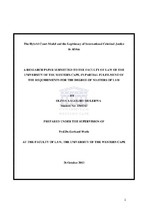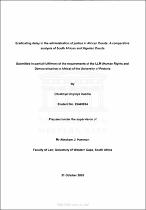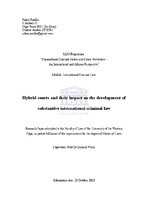Evaluating the legal framework of the hybrid court for South Sudan
Abstract
The Republic of South Sudan became independent from the Republic of Sudan on 9 July 2011.
South Sudan has an area of 644, 329 km2 and a total estimated population of around 12, 6
million.1The original state of Sudan was intensely divided along ethnic, religious and ideological
lines. The general population of the Republic of Sudan is mainly Sunni Muslim whereas the
South Sudanese are mostly Christian, with small populations that still practice African
indigenous religions.2While the Republic of Sudan is predominantly Arabic-speaking, English
and over sixty local languages are spoken in South Sudan.3
Collections
Related items
Showing items related by title, author, creator and subject.
-
The hybrid court model and the legitimacy of international criminal justice in Africa
Mulerwa, Olivia Kaguliro (University of Western Cape, 2013)Hybrid Courts are the latest innovation in the prosecution of international crimes after the era of the International Criminal Tribunal for Rwanda (ICTR) and the International Criminal Tribunal for the former Yugoslavia ... -
Eradicating delay in the administration of justice in African courts : a comparative analysis of South African and Nigerian courts
Obiokoye, Onyinye Iruoma (University of the Western Cape, 2005)A well functioning judiciary is a central element of civil society. It is the sole adjudicator over the political, social and economic spheres. Judiciaries in many African countries suffer from backlogs, delays and corruption. ... -
Hybrid courts and their impact on the development of substantive international criminal law
Rindler, Julian (University of the Western Cape, 2013)The aim of this study is to scrutinise, in particular, the legal bases of and decisions taken by various hybrid courts with regards to such consolidating or fragmenting effects on substantive international criminal law. ...




